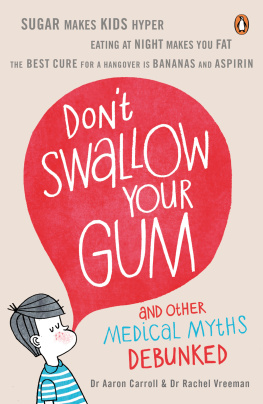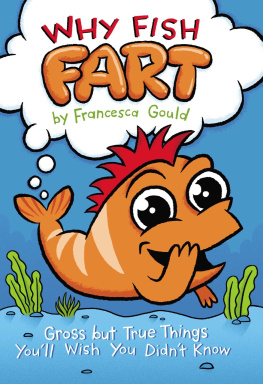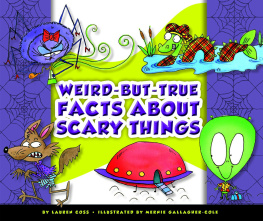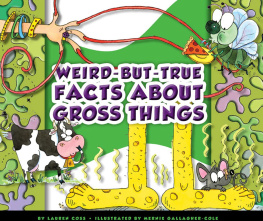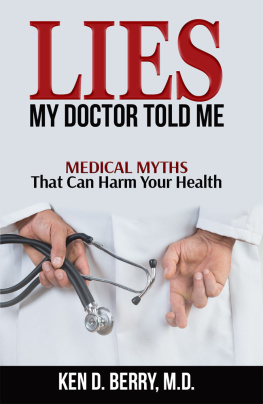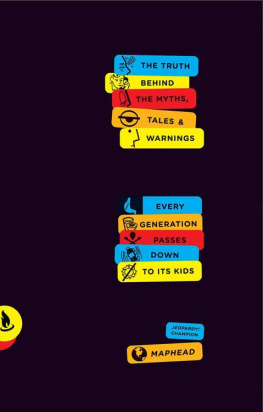Dont Swallow Your Gum
And Other Medical Myths Debunked
DR AARON CARROLL AND DR RACHEL VREEMAN

PENGUIN BOOKS
PENGUIN BOOKS
Published by the Penguin Group
Penguin Books Ltd, 80 Strand, London WC2R 0RL , England
Penguin Group (USA) Inc., 375 Hudson Street, New York, New York 10014, USA
Penguin Group (Canada), 90 Eglinton Avenue East, Suite 700, Toronto, Ontario, Canada M4P 2Y3
(a division of Pearson Penguin Canada Inc.)
Penguin Ireland, 25 St Stephens Green, Dublin 2, Ireland (a division of Penguin Books Ltd)
Penguin Group (Australia), 250 Camberwell Road, Camberwell, Victoria 3124, Australia
(a division of Pearson Australia Group Pty Ltd)
Penguin Books India Pvt Ltd, 11 Community Centre, Panchsheel Park, New Delhi 110 017, India
Penguin Group (NZ), 67 Apollo Drive, Rosedale, North Shore 0632, New Zealand
(a division of Pearson New Zealand Ltd)
Penguin Books (South Africa) (Pty) Ltd, 24 Sturdee Avenue, Rosebank, Johannesburg 2196, South Africa
Penguin Books Ltd, Registered Offices: 80 Strand, London WC2R 0RL , England
www.penguin.com
First published in the USA by St Martins Press, 2009
Published in Penguin Books 2009
Copyright Dr Aaron Carroll and Dr Rachel Vreeman
All rights reserved
The moral right of the authors has been asserted
Except in the United States of America, this book is sold subject to the condition that it shall not, by way of trade or otherwise, be lent, re-sold, hired out, or otherwise circulated without the publishers prior consent in any form of binding or cover other than that in which it is published and without a similar condition including this condition being imposed on the subsequent purchaser
ISBN: 978-0-14-192926-2
For Aimee, who actually believes that there is nothing I cannot do, and Joe, L of my L, who wanted to get us myth-busting capes
Introduction
Is wearing a hat the key to staying warm when the temperature plummets? Do you wish you could use more than 10 per cent of your brain? Have you switched to waxing your legs because shaving made the hair grow back faster and thicker? Is it a struggle for you to drink the recommended eight glasses of water a day?
Every day, you hear or think things about your body and health that are not true. Maybe these ideas are simply unproven. Or maybe these ideas about your body and how to keep it healthy have actually been shown scientifically to be false.
And yet we still see these things on TV, read them in magazines or hear them from our friends. Even your doctor may have told you one of these myths.
One of the dirty little secrets in the practice of medicine is how little of what we doctors do is actually proven. People assume that if doctors recommend something then it must be correct. To know something is true, however, requires scientific research, and good research requires time and money. Although there are millions of people and billions of pounds invested in scientific research, there just isnt enough to go around to answer every question; especially since the focus of modern research is usually on the most serious problems and the most advanced drugs and procedures.
Often when a doctor tells you to do something, its just his best guess. And thats okay. A good doctor builds on his training, experience and knowledge to give you his best advice, so most of the time this medical advice will be useful and helpful. However, another doctor may give you different advice. Whos right? How do you know whom to trust?
If this is happening with important medical issues, what about those things that are less critical the things your mother warned you about? Or the things your friends told you they saw on TV, or even the stuff you read in popular health books?
The fact is that often we just dont know whats true. Thats where the idea for this book came from. Many things you believe about your health, things you were told as a child, are simply unproven. Again, thats okay, but these ideas should not be given the same weight and credence as those that are proven. Its in our best interest to understand where these unproven beliefs came from, and then judge for ourselves whether they are useful.
Some of these myths have actually been studied. So we can look at what the studies say and make a judgement. How do we decide whether to trust scientific studies? We are both doctors and researchers. In our professional lives, we spend a great deal of our time teaching people, from parents to other doctors, how to understand health research. As researchers, we strive to maintain a sense of fairness in our work; we are careful not to make any decisions before the experiments are complete. Therefore we are able to accept whatever the science tells us, regardless of what we might have believed before. We want to give you a crash course in health research and scientific studies so that you can understand how science helps us decide whether a belief is right or wrong. As part of this crash course, we suggest a quick look at the section Boring Research Terms That You Might See in This Book. We dont want you to believe something is a myth just because we said so. We want you to understand why we said so.
The best possible type of study is what the scientific world calls a randomized controlled trial (see the Boring Terms section.) In these studies, people are secretly given one of two or more treatments. In the best research, no one involved in the study knows which person is getting what treatment. By looking at what happens to people in this kind of study, we can tell what effect the treatment or situation caused. Randomized controlled trials are the only way to prove causation. You should be sceptical when anyone tells you something has been proven to work or proven to cause something unless the outcome was a result of a randomized controlled trial. But these types of trials are pretty rare in the medical world because they are expensive and complicated. Sometimes they are even unethical. You have probably heard tobacco companies say that smoking has never been proven to cause cancer. This is because there has never been a randomized controlled trial of smoking and cancer. And there never will be. Can you imagine anyone approving a study that secretly forced some people to smoke so that we could see if they got cancer? That would be crazy! And wrong!
When we simply cant get a randomized controlled trial, we have to look at the next best thing. Through other types of studies, called epidemiological or cohort studies, we can look at associations. An association is a relationship one thing has with something else. Association and causation are not the same. While we cant prove that smoking causes cancer, there is an overwhelming amount of evidence that smoking is associated with cancer. With evidence that reveals an association between smoking and cancer, we cant say we are 100 per cent sure that smoking causes cancer, but we are as close to being sure as we are ever going to get. The scientific studies that tell us about associations usually involve big groups of people (the bigger, the better), where we can best see if these people have certain things in common (like smoking and getting cancer).
Many of the myths in this book have this type of evidence stacked against them. Maybe there arent any randomized controlled trials to dispel the myth, but there are large epidemiological or cohort studies that point to that answer. When scientific evidence for or against something builds up, we argue, you should believe the science. In this book, you will always see us argue on the side of science.

